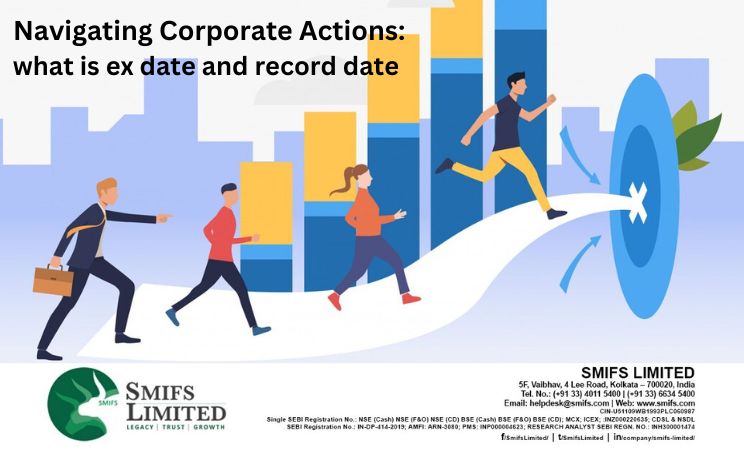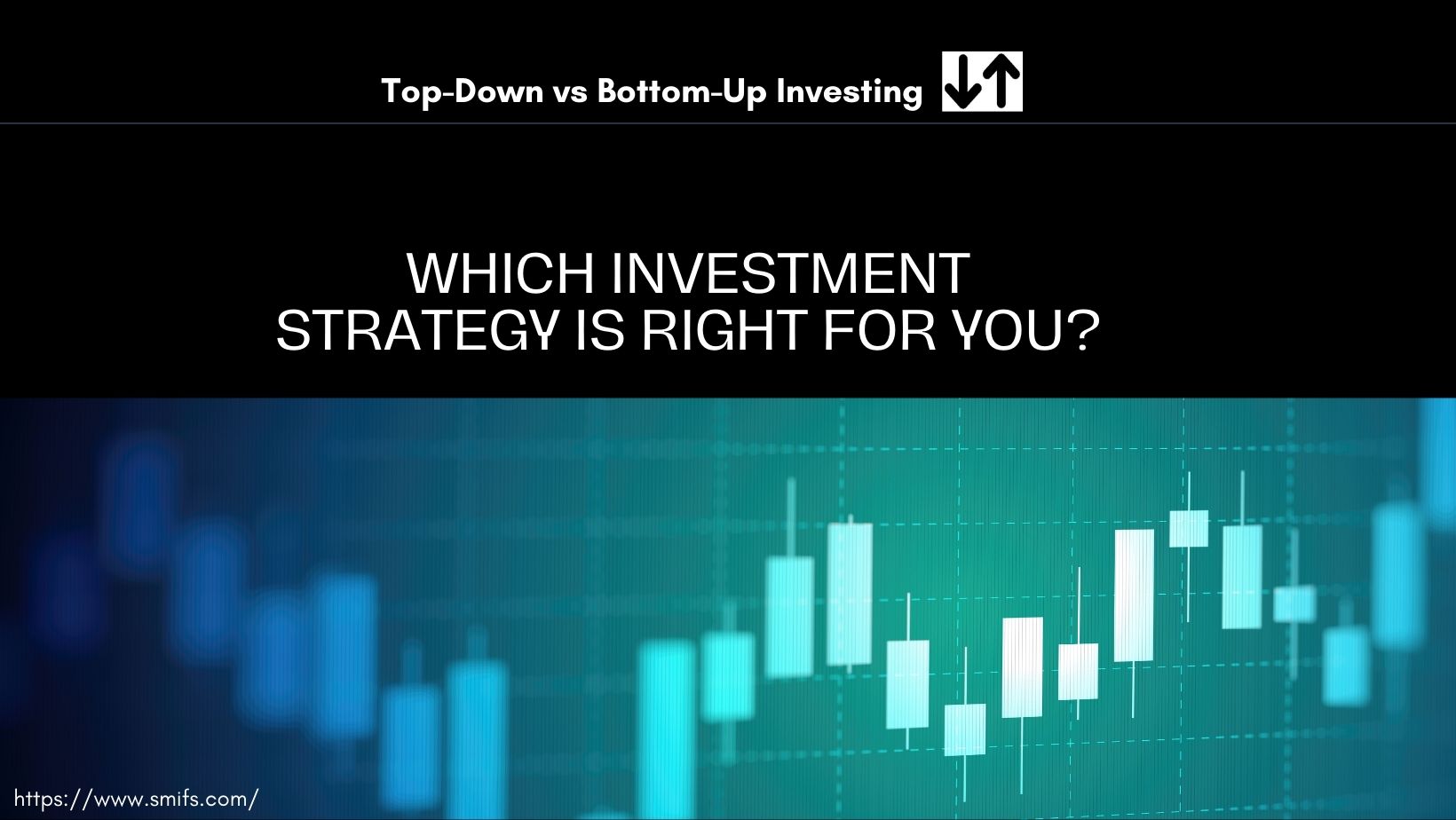While navigating corporate actions, an investor should know what is ex-date and record date.
When making investment plans, each investor has a distinct goal in mind. Some are aiming to save money for retirement, while others wish to invest for a steady income. Dividend investing is one of the methods used by investors to achieve long-term growth on their stock market investments. Investing in businesses that provide steady dividend payments and profitable returns is what it entails.
There are two dates that are commonly mistaken with the concept of dividends. This article will address ex-date vs. record date in order to dispel any doubts and ensure that your investment is successful
What is an Ex-date in Corporate Actions?
The ex-date, also known as the ex-dividend date, is the day on or after which a stock purchaser loses their eligibility to receive dividend payments. A share of any company that you purchase is only credited to your demat account T+2 days later. In the event that you buy shares on Tuesday, your account will be credited with them on Thursday.
Now, the ex-dividend date will be August 7th, Wed., if the corporation announces an impending dividend on, say, July 30th, Tuesday, and the record day is August 8th, Thursday. This implies that those who purchased the stocks on August 7th or after will not be qualified to receive the dividend.
It’s crucial that you get what an ex-date and record date are in order to invest and receive dividends, as the company’s example above is merely meant to help you grasp ex-date.
What is a Record Date in Corporate Actions?
A stock exchange-listed corporation has daily fluctuations in the ownership of its shares. Accurately announcing the dividend to shareholders becomes challenging due to the frequent changes in share ownership. In such a case, a date is set by the listed company, and all shareholders of the firm that is on file are entitled to the dividend on that specific date.
The record date is the day the corporation decides to pay the dividend. It is also commonly referred to as the record date by many businesses. So, you shouldn’t be puzzled because both have the same meaning.
For the purpose of illustration, let us consider the following scenario: all shareholders who are on file as of the close of business on January 10, 2022, will get their dividend from XYZ firm, a publicly traded firm that pays dividends to its stockholders.
How do Ex Date and Record Date Affect Shareholders?
The dividends paid to shareholders are decided on two dates: the record date and the ex-date. In order to comprehend the impact on you as a shareholder, allow me to provide an example.
As an illustration, on April 20, 2022, the business ABC declared dividends; the record date for these payments is May 5, 2022. The dates April 20, 2022, and May 3, 2022, respectively, will be designated as the declaration and ex-date, respectively, of the ex-dividend. This date, or before, is when you should purchase the specific stock. The record date, which in this case is May 5, 2022, is normally two days before to the ex-date.
As a result, if you purchased the stocks prior to the ex-date, which is May 3, 2022, you will be qualified for the dividend advantage; on the other hand, if you purchased after the ex-date, you will not be eligible for dividends.
The Purpose of Ex-Date and Record Date in Corporate Actions
The dates that govern when an investor will get their dividend payment—the ex-date and record date—are crucial to their trip. Owners are added to the company’s dividend-paying list as soon as their shares is transferred to their account.
Dividends will be paid to shareholders on the dates that the corporation chooses as the ex-dividend date and the record date. The ex-date is the deadline on or after which you will lose your eligibility for the dividend, and the record date is the date by which you must be included on the company’s list in order to receive the dividend, to put it simply.
As a result, knowing the difference between record and ex-date dates affects the overall amount of money you can make as an investor.
The Relationship Between Ex-Date, Record Date, and Dividend Payment Date
Knowing that you are aware of the ex-date and the dividend record date, it is critical to comprehend their relationship as well as the date of the dividend payment. The ex-date of the dividend is disclosed in accordance with stock exchange regulations, however the company announces the record date for the payment.
Because stock traders are permitted a settlement period on exchanges, the ex-date usually occurs two days prior to the record date of the dividend. Thus, on the due day, you will appear as a registered shareholder of the corporation if you buy the stocks before to the ex-date. Therefore, the connection between the two dates.
The date on which the business will genuinely distribute the dividend to each and every shareholder is known as the dividend payment date. Thus, let’s examine the equation below to aid in your understanding:
With Company A announcing that its due date is April 10, 2022, its ex-date is April 8, 2022, and its payment date is May 11, 2022. Accordingly, if you buy the stock before April 8, 2022, you will appear on April 10 as a registered shareholder and receive your dividend on May 11 of that same year.
Which Is More Important, the Record Date or the Ex-Dividend Date?
Both are significant because, in broad terms, they are two of the four dates that all investors need to be aware of regarding the dividend payout procedure. On the other hand, the ex-dividend date can be given greater weight. This is so that investors can be deemed owners of record for the current dividend payout if they purchase shares before that date. On the record date, the names of the shareowners are simply gathered. Therefore, it’s essential to know the ex-dividend date if you’re looking for dividends so that you may schedule your transaction appropriately.
Determining Eligibility for Dividends and Stock Splits Based on Ex-Date and Record Date
The goal of investing in any given company’s stock is to increase one’s wealth. The business provides a dividend to that person in order to serve as income for that reason. However, purchasing stock does not automatically qualify you for dividend payments. The dividend is also contingent upon the date of purchase and company registration.
Therefore, you must purchase the equities before the ex-dividend date, which is typically two days prior to the record date, in order to be eligible for the dividend. Additionally, keep in mind that it takes T+2 days to get updated and registered. Use those days as a buffer instead of waiting until the last day to purchase stocks.
Factors to Consider When Trading Stocks Around Ex-Date and Record Date
Making extra money is your primary goal when investing in the stock market; for others, it may be a long-term financial goal. When trading your stocks around ex-date and record dates, it’s critical to know the variables that could impact your dividend amount, regardless of the underlying cause.
The most important thing to think about is who and how the dividends on the stocks you buy will be distributed. You should buy your stocks before the company’s ex-date if you wish to get your dividend throughout the current dividend cycle.
In a similar vein, you can buy stocks at any time, even beyond the ex-date, if you think the prices are excellent and it doesn’t matter if you get the current cycle payout. In this case, even if you currently owe the stocks, the seller who sold you the stocks will still receive the dividend.
In summary, the most crucial element to take into account while trading equities on ex-date and record dates is a dividend.
Who Sets the Ex-Dividend Date?
The stock exchange’s regulations, which govern how stocks are traded, determine the ex-dividend date.1 To indicate to traders that a stock is trading ex-dividend, certain news sources and trading platforms append the ticker symbol with an XD modifier.
What is T+2?
India has a settlement cycle of T+2. The shares will be delivered to your DEMAT account by May 15 if you acquire them by May 13. In the company’s records, you will be listed as a shareholder if the claims are received by May 15, the Record Date. The seller of the shares will be an eligible shareholder as of May 15 (the Record Date) if you purchase shares on May 14 and they are deposited to your DEMAT account by May 16.
Who Sets the Ex-Dividend Date?
The meaning of the ex dividend date is determined by the stock exchanges, not by the individual public corporations. The ex-dividend date is specified by the exchange, but the company issuing the stock controls the declaration, record, and distribution dates.
Procter & Gamble had a record date of March 15 and a declaration date of March 6 in the case above. The ex-dividend date in this case would be March 13 in order to give time for trade settlement, according to the New York Stock Exchange (NYSE). The majority of ex-dividend dates are determined by the NYSE, and all other exchanges follow suit.
Conclusion
When it comes to any stock’s dividend process, the ex-date and record dates are two important dates. Let’s say that even though you bought the stocks, you weren’t registered with the corporation on the record date. If so, you won’t be able to benefit from the dividend advantages that the company offers its shareholders.
Consequently, when trading stocks, keep in mind the ex-date, which is often two days prior to the record date, and buy your shares on or before that day. Furthermore, the shareholder receives cash on the dividend distribution date rather than the ex-date.




